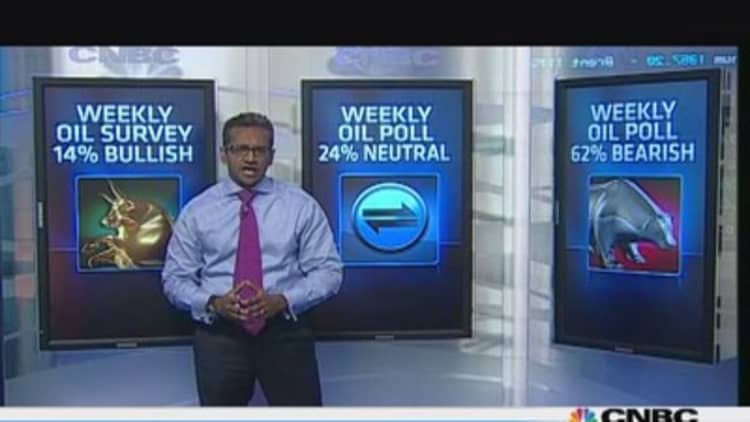
The Organization of Petroleum Exporting Countries (OPEC) will likely keep production targets unchanged at the group's meeting this Wednesday to offset declining output mainly from Libya, strategists told CNBC.
Despite continued increases in U.S. domestic supply and the possible return of Iranian crude to world markets by late-2014, supply disruptions amongst OPEC members Libya, Iraq and Nigeria will mean the producer group will hold off cutting output targets from its current 30 million barrels a day.
(Read more: Iran oil, energy sanctions still in force: US)
Libya and Nigeria have "big problems" keeping up production which is one reason why OPEC has been producing below its set quota, said Thina Margrethe Saltvedt, senior macro oil analyst at Nordea Markets in Oslo.
This week's OPEC meeting will be a "non-event," Saltvedt concluded, since the group has been producing around its current target of 30 million barrels-a-day "thus I don't see any reason of changing it in the short term."
Analysts estimate oil exports are down to a fifth of the more than 1 million barrels a day Libya used to export until the summer, when occupations by former militia fighters and protesters of oilfields and ports began.
(Read more: Oil prices maybe losing Iranian 'risk premium')
Prime Minister Ali Zeidan has so far failed to negotiate an end to a series of sit-ins and strikes by security guards, civil servants, militiamen and other groups calling for everything from security and autonomy to a greater share of oil wealth, Reuters have reported.
'Rollover'
The OPEC meeting is largely perceived as market neutral, strategists said. More than 60 percent (18 out of 29) of respondents in CNBC's weekly oil market sentiment survey said prices would decline this week, 24 percent (7/29) are neutral while 14 percent are bullish (4/29).
Brent crude oil - the benchmark used to price two-thirds of the world's internationally traded crude oil – is up 5 percent for the year and off 14 percent from the lows of the year. That helps major Gulf producers ensure sufficient domestic budgets to cover key expenditure on social welfare. At the same time, prices have not risen to the elevated levels that may hurt demand from key consumers.
(Read more: US shale revolution leaving Europe in the cold)
"OPEC is happy with current prices, above $90 but below $115," said Tom James, chairman & co-founder at Navitas Resources.
UBS strategists say OPEC would "rollover" its 30 million barrel-a-day production quota, and price would be an important consideration.
"With Brent crude oil prices hovering at $110/barrel - far above the 'fair value' of $100 - and the elevated supply disruption in Libya we see it as rather unlikely that OPEC will cut its quota at the upcoming meeting," strategists Dominic Schnider and Giovanni Staunovo said in comments emailed to CNBC.
(Read more: US oil ends November in the red; Brent shines)
Ultimately, OPEC's de facto leader Saudi Arabia will cut supply to rehabilitate the longer-term return of Iranian crude, strategists and traders said.
"I can't see any OPEC output change at this meeting," said David Nevin, energy futures broker at Tower Broking. "We are still a long way from seeing a large amount of Iranian crude return to the market. There is a possibility of additional barrels to Asia but I expect the Iranian exports to remain around 1 million to 1.3 million barrels-a-day. Saudi (Arabia) will make any adjustment to their exports when needed so not to over supply the market."
— By CNBC's Sri Jegarajah. Follow him on Twitter @cnbcsri



